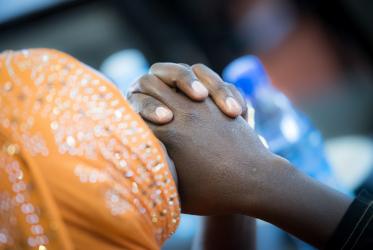"The pilgrimage of justice and peace is a commitment to being together on the way as churches and ecumenical partners at all levels from the local to the global, a way of accompaniment, listening to each other and solidarity”, said Rev. Dr Martin Robra, World Council of Churches (WCC) programme executive for Ecumenical Continuing Formation and professor at the Ecumenical Institute Bossey.
Robra was reflecting in Kigali, Rwanda this week on the theme of the next assembly of the All Africa Conference of Churches (AACC).
He was invited by the general secretary of the AACC, Rev. Dr André Karamaga, to ensure complementarity between the AACC Assembly theme and the Pilgrimage of Justice and Peace.
At its jubilee Assembly, in Kampala, 2013, just prior to the WCC’s 10th Assembly, the AACC spoke of peace, justice and dignity for Africa.
The theme of the forthcoming eleventh assembly “Respecting the Dignity and God’s image in every human being” has strong connections with the core value of the pilgrimage that requires mutual respect.
“The theme presents a ground rule for all of us, for our relationships and our working together”, said Robra.
Busan 2013: God of life lead us to justice and peace
For Robra, the Busan assembly was a conscious decision to move from a static understanding of ecumenism to process and movement.
“Being on a pilgrimage means not to stay where you are, but to move forward and to encounter new people on the way, an opportunity to learn new things and to make new friendships”, he said.
God’s own pilgrimage
Sharing reflections on the theological aspects of the pilgrimage, Robra stated: “it is very important to understand that we are to participate in God’s own journey of life, peace, justice and new creation”, he said.
The pilgrimage process keeps the main dimensions of the work of the churches in the WCC in close interaction: holistic mission, the search for unity and diaconal action.
“We are people of the way – this is how Christians spoke of themselves before they were called Christians in Antioch. The disciples followed Jesus on the way from Galilea to Jerusalem and were led by the Holy Spirit into the world announcing God’s reign through preaching, teaching, action and prayers also for the others, even the enemy”, he said.
Robra affirmed that the mission statement ‘Together towards Life’, which emphasizes mission from the margins and the role of the Holy Spirit in God’s mission, “captures well the contemporary challenges of globalization, the shift of gravity of the center of Christianity to the South and the East, the growing importance of Pentecostal, charismatic and African instituted churches as well as the interreligious context.”
“Increasingly Pope Francis and many other church leaders are speaking of deepening the unity on the way. And last but not least, the WCC intensifies its efforts to sharpen the understanding of diakonia and diaconal action, addressing some of the tensions that have surfaced in recent years around the growing role of specialized ministries of the churches”, he added.





